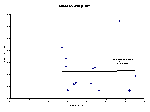Introduction:The role of PET scans in predicting survival with locally advanced pancreatic cancer remains unestablished. This study was undertaken in patients with locally advanced biopsy proven pancreatic cancer to determine the ability of PET scan standardized uptake values (SUV) to predict survival.
Methods:PET scans were undertaken and Average and Maximum SUV calculated for twenty patients with biopsy proven pancreatic cancer prior to chemo/radiation therapy. All patients had extensive vascular involvement without metastases by celiotomy and/or CT scanning. The relationship between SUV and survival was determined using a two-variable linear regression model. As well, patients were grouped relative to the median SUV and compared: low Average SUV vs high Average SUV and low Maximum SUV vshigh Maximum SUV. Results:Mean survival was 6.5 months + 5.4 (median 5.1 months). PET scans were positive in 17 (85%) patients and denoted no regional/metastatic disease; 3 (15%) patients had PET scans without significant uptake. The mean Maximum SUV in patients with positive scans was 5.7 + 2.71 (median 5.2) and the mean Average SUV was 4.1 ± 1.29 (median 3.8). By regression analysis, Average SUV (Figure 1) and Maximum SUV did not correlate with survival. By survival curve analysis, patients with low Average or low Maximum SUV did not have different durations of survival compared to those with high Average or high Maximum SUV. Patients with “negative” PET scans had significantly longer survival (p<0.03). Age, gender, diabetes, CA19-9, operation undertaken, and tumor histology did not impact survival or SUV. Conclusion:In a homogeneous group of patients with locally advanced biopsy proven pancreatic cancer undergoing standardized treatment, intensity of PET uptake (i.e., SUV) does not impact survival, suggesting that PET scans are not good measures of tumor metabolic activity and biologic behavior and that tumor metabolic activity has a lesser effect on survival than other factors. Negative PET scans may be a favorable prognostic factor.
 500 Cummings Center
500 Cummings Center +1 978-927-8330
+1 978-927-8330
 +1 978-524-0461
+1 978-524-0461